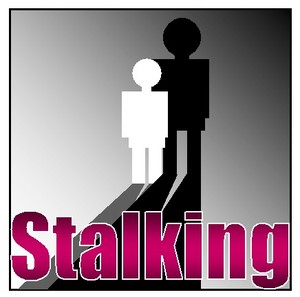by Sarah Prager
January is National Stalking Awareness Month.
There are no scars from the domestic violence I endured. I never had a black eye or a bloody lip or bruises to cover up. My girlfriend, “Luciana,” had a hold on me in a way that doesn’t leave a physical trace. She stalked me.
I don’t mean that she looked me up on Facebook all the time. The term “stalking” is thrown around casually and humorously in a way that in no way reflects what it really is.
I met Luciana in September 2007, when I was starting my senior year at Boston University. I was fascinated by her. After dating girls in high school and college, now I had found a woman. She had life experience, she had a job, she had a car, she had her own apartment. She had moved here from Brazil and taught herself English. She offered me a group of cool, older friends. She offered me independence from school life.
I didn’t mind that her job was working at a Dunkin’ Donuts and a dry cleaner while cleaning houses on the side. I glossed over the fact that her small apartment was shared with three other roommates and I was hospitalized for a staph infection I got there. I accepted that she had come here illegally and that she didn’t have a driver’s license to drive her dying car with.
It wasn’t until we moved in together that she showed me how controlling she could be. She monitored my emails and text messages. She told me I was worthless enough times in enough ways that I believed her. Though I didn’t realize it at the time, it was a typical situation of emotional abuse.
I left her on Feb. 13, 2009. When I told her I didn’t want to be with her anymore, she showed me the diamond ring she was going to propose to me with. My little sister called me asking why I was being mean to Luciana after receiving a phone call from Luciana painting me as heartless. Every bit of leaving that basement apartment in a Boston suburb was gut-wrenchingly difficult for me.
Luciana slapped me across the face and then convinced me that I could leave her but I should still spend the night there. I thought she was so kind for giving me a place to sleep. It got dark and I decided I couldn’t stay. I had packed my bag to leave so many times and this had to be it. I vomited. My insides were torn apart between feeling a need to stay and a need to go. With my last bit of strength, I took a bag with some clothes and headed for the door. She took my phone and keys and blocked the only exit. That was the only time I really felt a jolt of fear for my safety. I wondered whether, even if I could bring myself to leave, she would let me.
I stayed on friends’ couches and floors for a month before I found a new apartment. I had a trash bag of clothes in my office that I would take to a different place every night.
Luciana texted me up to 50 times a day. Without having to participate beyond reading them, the texts took me through the entire cycle of abuse multiple times a day: remorseful texts telling me she was sorry, angry texts berating me for my lack of response, bitter texts calling me a whore, and then more remorseful texts telling me she loved me. She didn’t need to make specific threats to intimidate me; I remembered enough warnings from when we lived together.
There were the phone calls, too, every day at my office, where I had to pick up without knowing who would be on the other end of the line. There were also voicemails on my cellphone that echoed the messages of the texts. It lasted for over a year. I kept my new addresses from her as best as I could, moving from apartment to apartment and changing jobs. I only started to feel safe when I left New England entirely.
It wasn’t until I began working in the field of sexual assault that I learned what stalking is. I hadn’t realized that it is a crime, and that, according to the CDC, it has happened to over 25 million people in the U.S.
Unfortunately, my story is not unique. Stalking isn’t just a creepy stranger watching from afar or someone obsessed with a celebrity, though those are certainly included. Three of four victims know their stalkers, and for a third it is their current or former partner. Stalking can happen during a relationship, like monitoring communication in my case.
There are many legal definitions from state to state, but they essentially say that stalking is a persistent pattern of making unwanted contact with someone to make them feel afraid. This contact can be in person, by phone, by mail or email, over Facebook, anywhere. Stalking can include anything from going through someone’s garbage to sending unwanted gifts. Unlike other crimes that can be charged after one incident, stalking behaviors occur repeatedly over a period of time.
We often explain away behavior like this as misunderstandings, but if you feel harassed, don’t ignore your gut intuition. If you are or know someone in that group of one in six women or one in 19 men who has been or is being stalked, there are resources to help.
January is National Stalking Awareness Month. This is an issue that affects every community. It’s time we name it for what it is: a crime, not a Facebook joke.
Source







 TrafficHolder.com - Buy & Sell Adult Traffic
TrafficHolder.com - Buy & Sell Adult Traffic